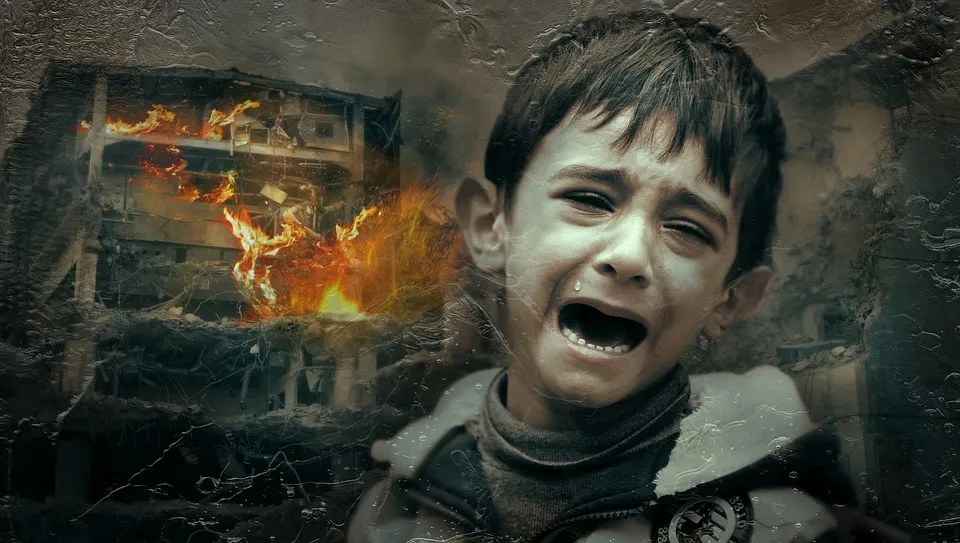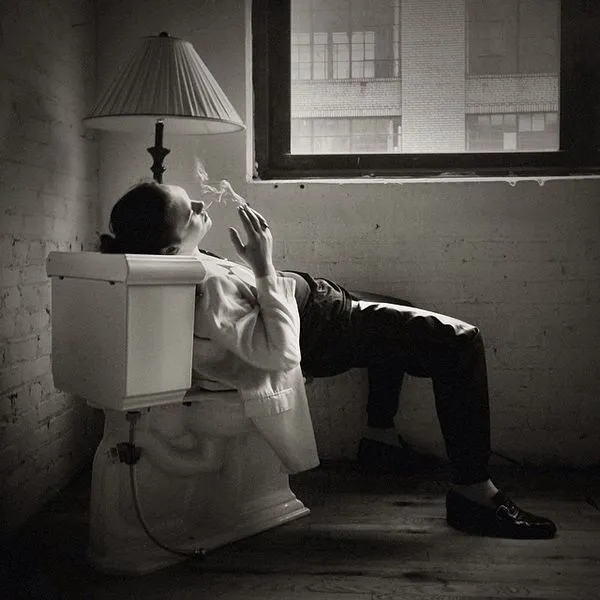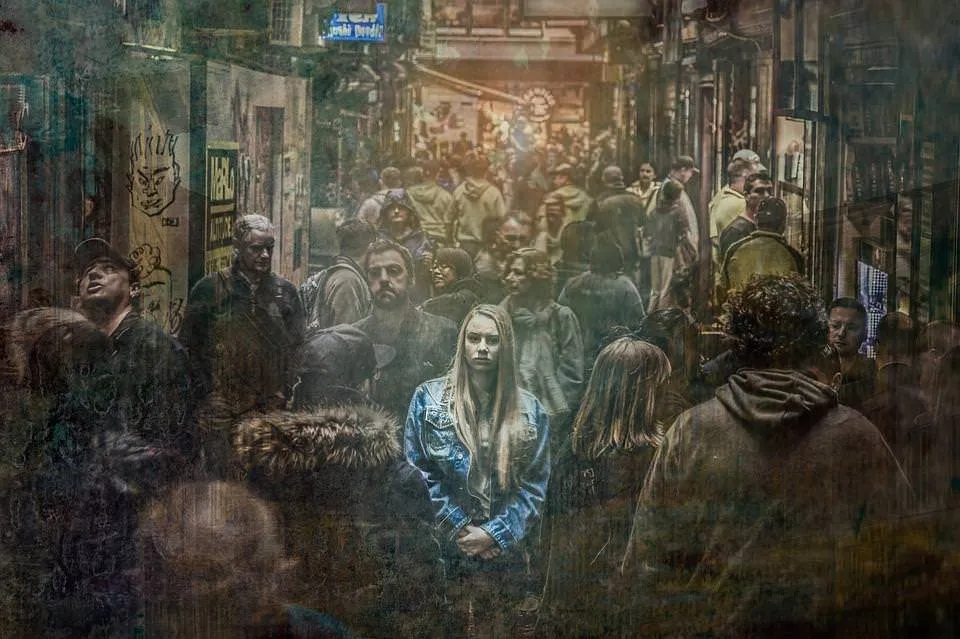My Anxiety
I can't remember my first anxiety attack. I can remember the absence of overwhelming anxiety, days where everything felt fine and managable. It's like I've been living in a nice open spacious open-plan apartment with great sunlight and white walls, only to gradually notice that someone else has moved in, and they like to close the blinds and lock the doors. The scariest part about it though is that that person is also me. They have my voice and my thoughts and they like to twist them and vocalize them loudly as I rattle on the door trying to get out.
Again with the melodrama, but it's such a strange condition that I think that if I met me from even six years ago, I wouldn't be able to explain the feeling without looking at myself like a confused stranger. The condition has become more intense as I've gotten older, and it can vary from me feeling slightly doubtful in everything I do, to full on locking me down and forcing me to relive fearful thoughts over and over as I struggle to find a way to just make it stop. so here below, I'm going to have bit of a dive into what exactly it is, what causes it and how to deal with it. I'm by no means an expert, I still get completely shut down by it on occasion, but I like to think that I've learned some useful techniques on how to deal with it, and I've certainly learned what things I should avoid.
In Clinical Handbook of Psychological Disorders, Third Edition: A Step-by-Step Treatment Manual, David H Barlow states that due to the nature of Generalized Anxiety Disorder (GAD from hereon out), and the difficulty finding effective treatment, some people would rather characterize it as a personality disorder due to the fact that a number of people seem treatment are unable to pinpoint the onset. He states:
Patients with GAD often present with a lifelong history of generalized anxiety. For example, several studies have found that a large proportion of patients with GAD cannot report a clear age of onset or report an onset dating back to childhood... Thus, whereas several other anxiety disorders (such as panic disorder) tend to have a later onset and more acute presentation characterized by exacerbations and remissions, initial evidence suggests that GAD has a more characterological presentation (although fluctuations in the course of GAD are often noted corresponding to the presence or absence of life stressors) (P.157)
But while panic disorder is characterized by sudden onset bursts of panic, and far more extreme physical reactions, including shaking, cold sweats and hyperventilating, GAD is more of a steady curve of unease, and slowly rising panic that tends to stay with you.

source OpenClipart-Vectors
It was triggered in me at probably the lowest moment in my life. I was living in Shanghai, far away from my family and friends, and some month ago, had lost my job as a copywriter. My money was slowly running out, but I'd taken a quick and easy job to just get by whilst I got back on my feet. Sadly the boss of the new job had decided that rather than paying us, she'd sooner make a dramatic escape by diving into a taxi. I remember standing in the street in the middle of nowhere, a crowd of 30 or more Chinese locals surrounding us. I was vaguely aware that a colleague of mine was trying to wrestle the boss's handbag from her as she tried to make an escape in the back of a taxi. It was getting dark, I knew that things were escalating, but I was kinda stuck in my head, with cold and tight silence closing in on me, feeling complete and utter hopelessness.
Obviously things worked out ok, I'm still in Shanghai, and eventually got back on my feet (something that took four years to do), but from that point on, the anxiety didn't really leave. Every time something small happened, I would feel sensation creeping through me, like a dementor attack from the best book in the world, Harry Potter and the Prisoner of Azkaban. As time went on, the severity of events needed to trigger this feeling got smaller and smaller, and for a time I was sure that I wouldn't feel normal again.
Two years ago, I was visiting home, and sat talking with my brother over a beer, and somehow it came up in conversation. There, he mentioned that he had also felt similar sensations for most of his adult life, and that it was common for men in the DeathBatter family. I was struck with disbelief. Nobody had ever mentioned it before. An interesting article here goes into the dynamics of men and mental health, but my theory regarding my own family is certainly that to discuss anxiety out in the open would just not be masculine.
Anyone who knows me would say that I'm not at all concerned about appearing outwardly masculine, but there's certainly an element of pride involved in not speaking up when I'm feeling overwhelmed. But it's more than that. I'm absolutely uninterested in being subject to the pity of others. I'm more socially awkward than socially anxious, but I absolutely hate having my inner thoughts and feeling scrutinized by those around me. It's also the case that talking it through rarely helps - if you're irrationally terrified of something happening, somebody rationalising the situation is about as useful as explaining the likelyhood of getting bitten by a snake to an Ophidiophobe.
 source kellepics
source kellepics
For an analogy that I think many people can relate to, it's like the feeling of being really high, and knowing with absolute certainty that the police are gonna come bust down your door and take you away. Your rational mind knows that they -probably- don't have a clue that you've been smoking, and even if they did, they're not likely to come bust you, but there is no way of stopping that niggling feeling from eating away at you as you wait desperately for it to pass and swear you'll never smoke again. 30 minutes and a tub of Ben and Jerry's later, you're feeling fine, and probably laughing at the opening credits to Fraggle Rock, and you're feeling stupid for ever even worrying. The only difference is with anxiety, it could be back again at literally any time with no trigger, and no guarantee that it's chemicals causing a disruption in your usual thoughts.
On the Rise?
The Anxiety an Depression Association of America states that the number of people in the US every year suffering from anxiety sits around 18.1 percent, with just 36.9 of those receiving treatment. The number for Generalized Anxiety Disorder is much lower, around 3.1 percent of the population, and while this is a lower percentage overall, that's still 6.8 million people in the US alone (number accurate for figures from 2017).
It feels like GAD is on the rise - something I've been wondering about recently, because while people like my dad and my granddad worked far harder jobs than I ever did, for like 40 years nonstop without ever changing career, I never once heard them complain or panic about whether there's more to life than what they were/are doing. Now they were both builders, and I'm not saying there's any shame in doing that, but I do wonder if they didn't dream for more. Perhaps I'm just projecting, as I find myself not just questioning, but actively panicking about my 'place in the world' and whether I'm 'achieving my potential.'
But the reality is that anxiety disorder has been a part of the human condition for probably forever, but at least since we as humans have taken a keen interesting in the way our brains work. The US Library of Medicine states that:
In 1621, Robert Burton described the symptoms of anxiety attacks in socially anxious people in his book The Anatomy of Melancholy 1: 'Many lamentable effects this fear causeth in man, as to be red, pale, tremble, sweat; it makes sudden cold and heat come over all the body, palpitation of the heart, syncope, etc. It amazeth many men that are to speak or show themselves in public.
In the same book, Burton cited Hippocrates' writing on one of his patients, who apparently suffered from what we would call “social anxiety disorder” today:
He dare not come into company for fear he should be misused, disgraced, overshoot himself in gestures or speeches, or be sick; he thinks every man observeth him.'.
To be honest, people in the 1600's probably had a bit more to be anxious about, what with scurvy, and people shitting out of second floor windows.
Anxiety itself is merely a survival instinct. A way of detecting threats and activating our flight over fight status, and making sure that we do our best to survive another day. Observe a cat when it's on edge, it will anxiously look around, ready to run at the slightest noise. Unless it's my cat, in which case it would be lazy enough to sit as a bomb-strapped train full of acid barrels towards it.

source BeauQ
But to answer the question of whether GAD is increasing, we have to look a little bit closer to our time. This rather casual article in Readers Digest claims that "The World Health Organization reports that the number of people suffering from depression and/or anxiety increased by nearly 50 percent between 1990 and 2013. Mike Ward, a psychotherapist and founder of the London Anxiety Clinic in the UK, has seen a 30 percent increase in patients with GAD clinic-wide in the last two years alone." While Fortune claims that "There’s a wealth of hard evidence: Between 1985 and 2016, the number of UCLA freshmen reporting feeling “overwhelmed” surged from 18 percent to 41 percent. Nationally, rates of “overwhelming anxiety” among college students spiked from 50 percent in 2011 to 62 percent in 2016."
To me it seems a little bit too simplistic to jump straight to blaming social media for everything, but I suppose it does make sense that we live in a far more connected age, where our triumphs and blunders are on display for everyone to see. But as with all mental health issues, we can only work with cases that are reported, and for shame-inducing issues such as anxiety and depression, people are far less likely to report them. One might also argue that while social media could be a factor in increasing GAD, it could also be merely bringing the issue more out in the open. The Internet itself has changed the way that we share and digest information (this article included).
What to Do and What to Avoid
I'm going to finish by talking a little about my personal experiences with substances/ techniques that can either calm or exacerbate the condition. Everybody is of course different, and what works for me may be different for you, so from here on out, your own judgement and experience should trump anything I say, but it's really just some observations.
Avoid Coffee
Coffee is like an anxiety injection for me. No matter the strength, the type, the colour or how much milk is mixed it, it will send me into a spiral of second guessing and fear. This overly honest blog from the Death Wish Coffee Company gives a whole host of reasons as to why coffee can trigger people predisposed to anxiety in general. Note that I said coffee, not caffeine - I can chin like 20 cans of coke without feeling a thing.
There is substantial evidence that caffeine itself doesn't have a direct effect on anxiety at all. Calm Clinic tells us that:
"Several studies examined the relationship between caffeine and anxiety. They found that there were interesting changes to the body that occurred when people with anxiety consumed caffeine. For example, those with anxiety may not need as much caffeine to experience the same benefits, but the research also showed that anxiety scores were no different between those that consumed caffeine and those that did not."
Researchers have suggested that the jittery feeling brought about by coffee has similar indicators to feelings of anxiety, and that while someone used to anxious sensations may interpret those jittters in a negative way, while someone less predisposed to axiety may relish the feeling. As far as I'm concerned, it's all the bloody same.

source Petr Kratochvil
Avoid Cigarettes
This is a far bigger problem for me because, frankly, I just love smoking. If I'm stressed at work I'll smoke, in spite of the fact that it's gonna give a short and acute burst of anxiety. Generally speaking I don't smoke for this reason outside of busy work days and extreme drunkness - by which point the alcohol has killed any anxiety or shame.
Avoid Smoking on the Toilet whilst Drinking Coffee and Dropping a Massive Shit
I've never actually done this, the idea disgusts me. I know people that do though, and I gotta wonder, aren't they scared of smoking and drinking fart?

source Sasha Kargaltsev
Do Take Deep Breaths and Try to Clear Your Mind
Something that I initially believed to be hippy bullshit actually works great for me. I'm incapable of meditating - I just don't have that much control over my thoughts, but during an actual anxiety attack, this has been the most effective for me. When thoughts are overwhelming, it makes sense that trying to block those thoughts will help, and the slow breathing just feels calming.
Do See a Doctor About Medication
This was in important step for me. I told my doctor about my anxiety and she gave me some very low dosage of Xanex. I was a little disappointed the first time I took it, as I thought it was gonna make me feel super high and floaty or something, when actually, it just made me feel...normal I guess? It killed the panic attack dead, almost instantly. Now I should say I only take it as a last resort, as I don't want to normalize it and feel like I need to take it, and there's a whole wealth of negative stories about it (usually when consumed with alcohol) so trust in your doctor's expertise and don't abuse it. Read more about the rise of Xanax here

source kalmia
Do Get Mildly High (if legal where you live)
I'm not talking concentrated CBD oil that makes you feel like you're travelling through time and space. Some of that nice daddy weed is more than enough. This is the most effective way of dealing for me, but of course I would only ever do it in a country where it's totally legal...
(https://www.nytimes.com/2017/04/18/magazine/americas-new-anxiety-disorder.html)
http://commonweb.unifr.ch/artsdean/pub/gestens/f/as/files/4660/21992_121827.pdf
